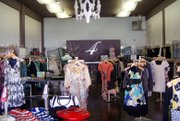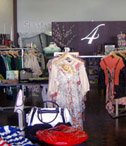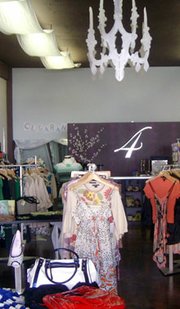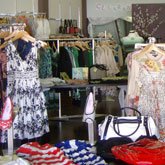POS-itive Efficiency
Why point-of-sale software is imperative for apparel companies.
What is the most efficient way to grow a business? Running lean systems to their optimum capacity; exercising tight inventory control; managing labor; and understanding your customers’ wants, needs and buying habits are strong places to start.
What if you had access to all this information in one easy-to-access central location and—without consulting the highest-paid business and marketing analysts—could garner answers to just about any question you had regarding business operations, sales and expenditures?
Point-of-sale (POS) systems serve apparel retailers and, increasingly, manufacturers and wholesalers, as well. Traditionally, POS systems have consisted of hardware that includes a printer, a bar-code scanner, a creditcard scanner and a cash drawer. The software has evolved to the point that systems can now encompass integrative tracking, databases that can provide analysis across all categories and sophisticated data-mining features that allow users to customize company reports.
One POS systems provider that has been catering to the apparel industry is Mountain View, Calif.–based Intuit Inc. Retailers—including Newport Beach, Calif.–based Toes on the Nose and Menlo Park, Calif.–based 4 Clothing Solutions —have found Intuit’s QuickBooks Pro POS system to be particularly useful. Representatives from these companies say the system has been crucial to productivity and development, helping them track stock, inventory, fashion trends and forecasting, demographic analysis, repeat customer incentives, and targeted marketing—to name just a few possibilities.
The Nose knows
Toes on the Nose surf shops, with locations at the Huntington Beach Hyatt Regency Hotel and in Laguna Beach, has been using the Quick- Books Pro POS system since opening its Laguna Beach store seven years ago. The program keeps track of detailed inventory, customers, sales orders, layaways and employee commissions for the company, which sells men’s, women’s and children’s surf apparel, footwear, eyewear and acces sories, including its own label.
“It has definitely been a great advantage for us,” explains Richard Allred, president of Toes on the Nose. “It is great for purchasing and forecasting trends because we can track what is trending up or down and refill inventory immediately because our warehouse [is linked to the program’s real-time system and] knows when items have sold.”
Justin Cleveland, operations manager for Toes on the Nose, says the system can classify every item in the store by category. “From there, we can break it down further. Which sunglasses are selling? We can compare Smith Optics sales to Spy Optic sales and skew our future buys to those numbers,” he says.
The company also relies on the QuickBooks timeclock feature. “Since all employees clock in through the system, we can track labor down to the minute, from any department,” Cleveland says. “This makes payroll infinitely easier because everyone’s hours are already accounted for.”
“Because the system is Web-accessible, our buyers can log in from any location and see what is selling, as can I,” Allred says. “I can immediately get labor numbers, track voided sales and run any report I need from anywhere.”
The POS system also makes it easy for the Huntington Beach location to interface with the Hyatt Regency resort, on whose grounds the store is located. “When [the hotel requests] our sales data, we can send it to them in a matter of seconds,” Cleveland says.
4 small businesses, too
Sisters Tamara and Julie Michel, owners of the 4 Clothing Solutions boutique, knew the value technology solutions could offer their business venture because they both have backgrounds in the Silicon Valley hightech industry. The shop, which specializes in women’s “virtually timeless classics” in sizes 0 to 14, has been in business four years and recently opened a second location, Boutique 4, in Mountain View, Calif. In addition to carrying apparel brands by up-and-coming apparel makers, the duo designs their own vintage-inspired apparel collection, simply called “4.” The store’s inventory is priced at $100 and under.
Instead of taking the virtual route with less overhead risk, these tech-savvy ladies followed the traditional path and opened a retail store. “We did consider [an online store], but so much about clothes shopping is about touching and feeling the clothes and trying them on,” Tamara Michel says. “We thought a bricks-andmortar store was the better route for us.”
The sisters have used QuickBooks Pro from the beginning. “This was our first venture into retail, and we knew a tech solution could only benefit us,” Michel says. “It helps us better understand financials, inventory and profitability studies month to month.”
Though the business is small, Michel says QuickBooks’ features have made operations infinitely more manageable. “We know exactly what items or sizes are in which store and can transfer them at will,” she says.
Michel says she researched several POS options but found that most did not have the functionality the sisters needed for a price they could afford. “We’ve saved in so many ways,” she says of the QuickBooks system. “I can’t imagine growing the business without it.”
Intuiting apparel companies' needs
In addition to its standard QuickBooks Pro system, which retailers can get for as little as $199, Intuit offers versions of QuickBooks that address the specific needs of manufacturers and wholesalers: the Quick- Books Premier Manufacturing and Wholesale Edition, which assists small businesses with up to five simultaneous users with the standard license, and QuickBooks Enterprise, which services businesses with up to 20 simultaneous users with the standard license. A threeuser version of the QuickBooks Premier system starts at approximately $2,000, and the more elaborate Quick- Books Enterprise has a base price of $3,000.
“Premier and Enterprise offer a variety of customized features for manufacturers and wholesalers,” says Laura Guntren, marketing manager of Intuit’s retail solutions group. “Just a few of the capabilities offered specific to manufacturers and wholesalers are the tracking inventory of both raw materials and finished goods, the creation of sales orders and track-back orders, purchasing and selling items in different units of measure, and setting pricing by product or item.”
On the retail side, Guntren says one of the key values of POS is to expand customer service. “You can create a detailed customer loyalty program that will allow you to track previous orders, give discounts for repeat business, and have a log of sizes and preferences—anything,” she says.

























